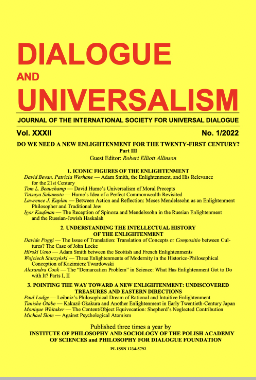(DE)CONSTRUCTING THE “OTHERNESS:” A DEBATE ON EDWARD SAID’S LEGACY
(DE)CONSTRUCTING THE “OTHERNESS:” A DEBATE ON EDWARD SAID’S LEGACY
Author(s): Ioana Constantin-BerceanSubject(s): Philosophy, History of Philosophy, Social Philosophy
Published by: Instytut Filozofii i Socjologii Polskiej Akademii Nauk i Fundacja Filozofia na Rzecz Dialogu
Keywords: Edward Said; orientalism; postcolonial studies
Summary/Abstract: The problem of social and cultural diversity has been a classic issue in the humanities and the social sciences throughout the entire human history. Starting with the 1970s academics were interested in a specific feature of this inter-cultural problem, namely how Western societies have understood and interpreted oriental societies through the period of imperial expansion. Even nowadays, some of the most complicated academic dialogues (and not only) are centered around the theories of post-colonialism and nationalism. The ‘subjects’ of these debates are mainly the Middle Eastern states and the predominant variable is the region’s main religion, Islam. The Orient signifies a system of representations framed by political forces that brought the Orient into Western learning, Western consciousness, and Western empires. The Orient exists for the West, and is constructed by and in relation to the West. The critics of Orientalism consider this theory to be a manner of regularized (or Orientalized) writing, vision, and study, dominated by imperatives, perspectives, and ideological biases ostensibly suited to the Orient. This article proposes a brief introspection into the creation of alterity in Western literature and a review of the perspective offered by the best-known critic of this paradigm, Edward Said.
Journal: Dialogue and Universalism
- Issue Year: 2024
- Issue No: 2
- Page Range: 209-221
- Page Count: 13
- Language: English
- Content File-PDF

